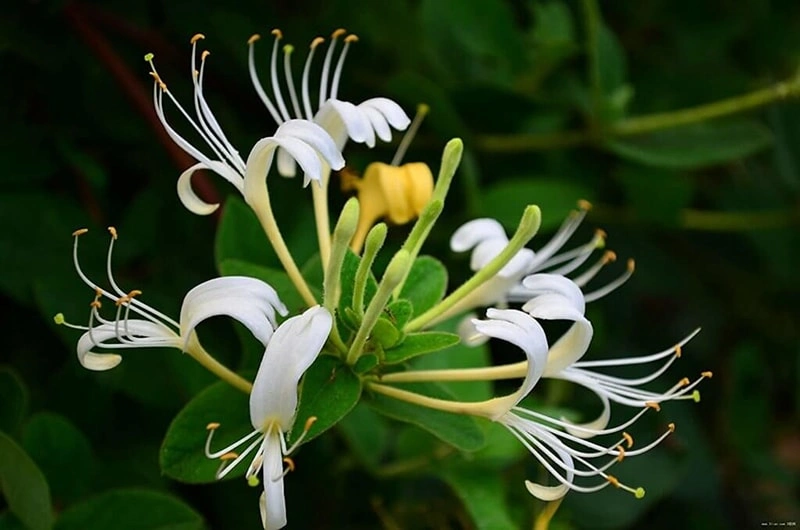For ages, honeysuckle has been esteemed for its soft fragrance and curative properties.
In addition to its beauty, this modest flower provides remarkable natural benefits that can comfort, calm, and protect our pets—offering a natural approach to support their well-being from nose to tail.

Honeysuckle (Lonicera japonica) is not merely a fragrant flower—it is a botanical treasure rich in antioxidants, flavonoids, and gentle antibacterial properties. Historically utilized in Eastern herbal medicine, honeysuckle has been esteemed for its cooling, purifying, and soothing effects.
For our pets, these identical attributes provide comforting relief for sensitive skin, mild deodorizing advantages, and a natural method to support balance and comfort in their everyday care practices.
Many pets suffer from dryness, itching, or minor irritation due to environmental factors like dust, heat, or grooming products. Honeysuckle’s natural compounds work to gently calm and restore skin balance.

Natural Soothing Power: Its mild anti-inflammatory properties help soothe sensitive or irritated skin.
Cleansing & Refreshing: Honeysuckle’s antibacterial qualities promote cleanliness while being gentle on the coat.
Aroma Therapy: Its light floral scent creates a relaxing and enjoyable grooming experience for both pets and their owners.
When added to grooming sprays, shampoos, or wipes, honeysuckle helps keep a clean, shiny coat without harsh chemicals—perfect for pets with delicate skin.
Beyond physical care, honeysuckle can also aid emotional well-being. Certain honeysuckle extracts are known for their calming scent, which may help alleviate mild stress or restlessness in pets—especially during travel, thunderstorms, or grooming sessions.
· A Calm Companion: The flower’s gentle aroma can create a soothing environment for pets, helping them feel more at ease.
At Phytopaw, we believe that nature provides everything pets need to thrive—calmly, gently, and beautifully. Our honeysuckle-infused formulas are designed with this belief at heart, combining the essence of this delicate flower with science-backed care for real results.
Each product is crafted to:
· Soothe and Protect: Relieve sensitivity and dryness while maintaining the skin’s natural balance.
· Refresh and Rejuvenate: Leave the coat clean, soft, and delicately scented with honeysuckle’s signature floral note.
· Support Emotional Calm: Encourage a peaceful state of mind during grooming, travel, or new experiences.
Phytopaw’s commitment to purity and sustainability ensures that every ingredient is responsibly sourced, cruelty-free, and safe for daily use. Because when our pets feel comfortable in their own skin, their joy naturally shines through.

Honeysuckle reminds us that nature’s most effective remedies are often the simplest. With its soothing aroma, protective antioxidants, and natural cleansing properties, this humble flower embodies harmony and healing—qualities every pet deserves to enjoy.
By embracing honeysuckle in your pet’s wellness routine, you’re not just caring for their skin or coat—you’re nurturing peace, comfort, and connection, one gentle touch at a time.
References
Tang X., et al. (2021). “Potential Application of Lonicera japonica Extracts in Animal Production From the Perspective of Intestinal Health.” Animals (Basel), 11(6).
Cao Y.X., et al. (2023). “Lonicerae Japonicae Caulis: A Review of Its Research.” Frontiers in Pharmacology, 14.
Li G., et al. (2022). “Supplementation with Honeysuckle Extract Improves Growth Performance, Immune Organ Indexes, and Gut Morphology in Geese.” Frontiers in Veterinary Science, 9.
Zhang X., et al. (2022). “Network Pharmacology‐Based Strategy for Exploring the Potential Therapeutic Targets of Honeysuckle (Lonicera japonica Thunb.) Against Inflammatory Diseases.” Evidence-Based Complementary and Alternative Medicine, 2022.
Liu C.W., Chen B.C., Chen T.M., & Chang Y.Y. (2020). “Effect of Different Extraction Methods on Major Bioactive Constituents at Different Flowering Stages of Japanese Honeysuckle (Lonicera japonica Thunb.).” Journal of Agronomy & Agricultural Science, 3(2).